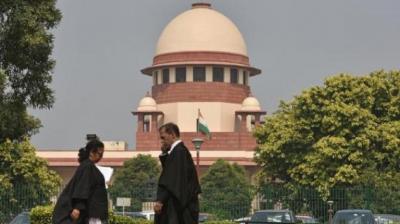AA Edit | PM, CJI words inspiring; quick action must follow
Prime Minister Modi and Chief Justice Chandrachud highlight the imperative for judicial reform, emphasising 'the ease of justice'
Addressing the 1.4 billion citizens of the nation as much as the Supreme Court, whose 75th anniversary celebrations programme he was attending, Prime Minister Narendra Modi brought into public discourse a much-needed and brilliant idea — “the ease of justice” — and termed it as a right of each citizen, and the judiciary, with the Supreme Court at the top, as the medium of delivery.
Linking the ease of justice as a right and its delivery as a precursor to the development of India, or the making of “Viksit Bharat”, the PM urged the judiciary to work on building its capacity, move from older laws to a newer context, and become more responsible to all its stakeholders.
By calling for a strong and vibrant judicial system, which works with a modern outlook and work ethos, befitting the times we live in, and trying to deliver to the expectations and requirements of stakeholders, Prime Minister Modi has made a major contribution to the public discourse on this subject: India can’t be a developed nation or achieve its larger goals unless the judiciary reforms, largely from within.
India’s Supreme Court, founded on January 28, 1950, can indeed look back at its history on its diamond jubilee celebrations day with pride. It has shown it could largely withstand the test of time, and a few bleak moments aside, has lived up to expectations. But it is not perfect, like perhaps no institution can be expected to be.
Mr Modi highlighted this aspect when he said the Supreme Court has strengthened our democracy, and linked the future of India with the political thinking of the day, the policies it makes, which would be foundations for tomorrow’s great India. Since it is the laws and policies made today that would define the country’s future and tryst ahead with destiny, it is imperative that the judiciary stands up to fulfil its mandate.
Mr Modi also stressed on the need for modernisation, a more commodious complex, and a need to enable technology to drive better quality and speed of delivering justice. He also stressed on the e-court mission.
Addressing the gathering, which included Mr Modi as chief guest, Supreme Court judges, the Chief Justices of high courts, retired SC judges and other dignitaries, Chief Justice of India D.Y. Chandrachud acknowledged the seriousness of the concerns and took up the issues head-on, when he said the judiciary needs to “begin difficult conversations” to remain relevant.
Calling the issue of huge case backlogs, the culture of adjournments and long vacations as vestigial appendages that “need to go”, the CJI said: “We must emerge from adjournment culture to a culture of professionalism.”
Calling the culture and habit of making lengthy oral arguments as a reason for repeat delays in justice outcomes, which made it difficult for judges to dispose of cases within a reasonable time, the CJI stressed on the need for reforms. He also rightly urged all stakeholders in the judicial system to consider newer ideas and approaches and experiment with such options as “flexitime” for courts to dispose of cases quickly.
He also acknowledged that if there were 65,915 pending cases in the Supreme Court alone, “we have to have a radical change in approach to decision-making. In our desire to ensure justice in each case, should we risk the court becoming dysfunctional?”
The PM and the CJI have touched the core of the issue at heart and are close to the aspirations of the people. Now, action must follow.


















